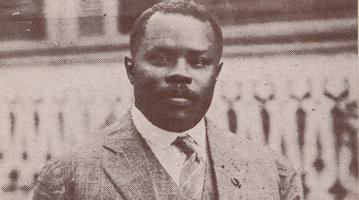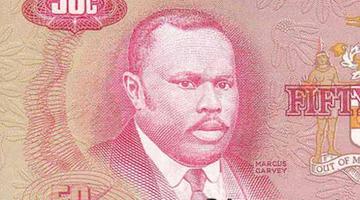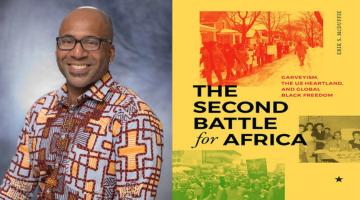In one of the last interviews before her death, Amy Jacques Garvey provides a powerful riposte to those contemporary revisionists that would seek to dismiss the power of the UNIA and Garvey movement – all the while remaining true to the cause of African redemption and Black liberation.
Almost half a century ago, on July 23, 1973, Amy Jacques Garvey—Universal Negro Improvement Association leader, writer, editor, mother, and second wife and widow of Marcus Garvey—died in Kingston, Jamaica at the age of 77. In January 1973, months before her death, the late historian Emory J. Tolbert interviewed Mrs. Garvey in Jamaica as part of his dissertation research. Tolbert’s dissertation was published in 1980 by the Center for Afro-American Studies, University of California, Los Angeles. Titled The UNIA and Black Los Angeles: Ideology and community in the American Garvey Movement, Tolbert's book is an important, early regional study of the UNIA—a study of what he calls “outpost Garveyism.” Instead of focusing on its Harlem headquarters, Tolbert studied the autonomy and independence of the local branches of the UNIA. The UNIA and Black Los Angeles was part of the historical reassessment of the Garvey and Garveyism in the late 1960s and early 1970s that was based on interviews with surviving Garveyites, on the discovery of archives and files from the organization, and on the reclaiming of Garvey by contemporary pan-Africanists and Black power advocates.
Mrs. Garvey herself played no small role in the reassessment and reclamation of Garvey and Garveyism. Indeed, during the years of Garvey’s imprisonment in Atlanta, and following his death in London in 1940, she steadfastly wrote in an attempt to keep the movement alive and to vindicate Garvey’s name. Mrs. Garvey edited the two-volume compendium Philosophy and Opinions of Marcus Garvey (1923). She wrote the historical biography, Garvey and Garveyism (1963), and the volume Black Power in America: Marcus Garvey's impact on Jamaica and Africa (1968). Mrs. Garvey also assisted John Henrik Clarke in editing the anthology Marcus Garvey and the Vision of Africa (1974).
In his dissertation, Tolbert included the transcript of his 1973 interview with Mrs. Garvey. It is a relatively short document, but in it, Mrs. Garvey provides a powerful riposte to those contemporary revisionists that would seek to dismiss the movement by casting the UNIA as a shambolic example of Negro dis-organization, while portraying Marcus Garvey as a madman, a dreamer, a narcissist, or a fool. Against this, Mrs. Garvey reminds us that Garvey was among the first Africans to push for African independence and self-government while most Negroes were calling for colonial reform. She points out that the UNIA was, in fact, a decentralized and democratic organization, and she attributes the “failure” of the UNIA to the collusion of white governments and their liberal Black lackeys. Moreover, the interview is a reminder that even at the age of seventy-seven, Mrs. Garvey had lost nothing of her vim and vigor. Especially when it comes to the cause of African redemption and Black liberation. We reproduce Emory Tolbert’s interview with Mrs. Garvey below.
Interview with Amy Jacques Garvey: January 3, 1973
Emory J. Tolbert
The following is the transcript of an interview with the widow of Marcus Garvey which was conducted only a few months before her death. Mrs. Garvey was encouraged to present whatever general comment she wished on the Garvey Movement before being asked to respond to specific questions. These are the remarks which Mrs. Garvey felt would reflect the most important aspect of the UNIA:
There were two petitions (one in 1922 and one in 1929) to the then League of Nations asking that that organization through its convention give a mandate [to the UNIA] over the former German colonies of South West Africa. The Persian delegate presented the petition on behalf of the UNIA because the UNIA wasn't a government and had not the privilege of presenting their own petition under the regulations governing the League of Nations. When the officials of the League of Nations saw that the thing had to be received and the far-reaching effect that it would have in breaking down this imperialism in African colonial rule, they changed the regulation governing the presentation of petitions to the League, so that when the petition went back again the ruling was that the petition would have to come through the country from which the people who presented it originated, thereby killing the whole thing. So it shows the machinations and strategies of the whole white structure. Always remember that white superiority is not just in America crushing the Black minority; it is an International, closely-knot system born, I think, of the fear of the white people that if they give the Black people all over the world a chance to develop by themselves and for themselves, they would be in jeopardy. And that is exemplified by the fact that after these wars where they fought among themselves, both the Asians and the Africans and the people in the Diaspora have come into their own so to speak, not fully, but at least they have made big steps forward. Today at the United Nations you have forty Black states represented. That is a demonstration of Garvey’s goal for Black people, you see. Black Nationhood! Africa Redeemed! Almost all of it has been redeemed, and what isn’t redeemed now is being fought for to be redeemed. So, therefore, the prophet has come into his own and the activist work is being carried on by others.
From 1920, Garvey sent a commissioner to explore conditions in Liberia, because at this time Liberia was in debt and the American government refused to loan any more money to Liberia, because the country was being run at a rate where there was no guarantee that they could pay back the loans. The Americo-Liberians did nothing really to develop the resources of the country and to make the economy viable. So Garvey sent this mission. The Commissioner negotiated and went over the cities located where mining could be done because of coal and agriculture. There was so much wild rubber there without being cultivated. There was so much cultivating to be done in the food line, because that’s important in feeding a nation, you see. Some experts were sent over, President King [of Liberia] himself organized the whole committee right there is [sic] Liberia. No person was allowed to be a pioneer unless he had some skill, some education or a little money so that he could start and develop something. Everything was properly organized. And, of course, by the time 1924 came, another ship was being bought by the UNIA members. And I want to say right here and now that that whole slander and slogan about “Back to Africa” was a slander on the movement because, as Garvey often said, “Some of you here in America and the West Indies are no damned good to the places where you live; you’re no damned good to yourselves. Who wants you in Africa?” The idea was to develop Africa — not to have a bunch of tramps going to lay down under a tree and don’t work. So it was no “Back to Africa;” no mass migration at all. In fact, that is impractical and stupid, and Garvey is not an impractical man. He is not a stupid man. He is a realist, you understand, and a man who saw into the future and planned for the future.
And so we go back to this migration business and “colonization,” which is the proper word. He got the concessions to these different areas that could be exploited and developed. Experts were sent with medicines and tents — everything to set up according to the instructions and advice of the very committee that King had appointed: what was necessary and how many to send in each batch so that they wouldn’t all swarm there without the adequate facilities to house them until they were able to on their own. Regardless of that thing, King abrogated the whole contract and agreement with the UNIA (without notifying the UNIA of what he had done) after the ship was bought and being fitted up and everything. And the very committee which he had appointed was opposed to his actions. And he threatened them with reprisals if they dared to do otherwise, because he had negotiated. It was [W.E.B.] Du Bois who had gone there so that [Harvey] Firestone could take over the concessions that he [President King] had already allocated to Garvey and his movement. Now, the result of this was a terrific amount of expense: thousands and thousands of dollars. He [King] went so far as to deport the last of the experts that went in and took away shiploads of supplies: medical supplies, camping supplies, everything. So the UNIA lost every damned thing.
Rightly or not, the Black star Line was not a venture that was just simply to buy ships and take people up and down. From 1919, before the Liberian colonization thing came about and the agreement was signed and negotiated for in the first instance, the concept of a shipping line [came about] because the Africans on the West Coast complained (they were Garveyites and interested in the redemption of their country) that when they had their products (especially like cocoa beans and perishable stuff and materials) they were told to bring it down to the wharf or pier to the ship. And then these white produce dealers would offer them little or nothing. They would say, “If you don’t want to take what we’re giving you, take it back into the bush.” Many a man has set down (Africans said they shed tears) because they had children at school and they had big obligations to meet. After toiling in the bush to produce whatever it was they had for shipment and being assured it was going to be shipped, it was left on the wharf to rot, and their whole future and the children’s futures were destroyed. This is the white man for you.
Then, in America, our people have always been hat in hand begging the white man for a job. Although we are skilled, although we are trained, we got the lowest jobs. At that time (remember this was fifty or sixty years ago) a Black man with a college education was a porter, was a hod carrier. He had to do that to eat, to feed his children. And Garvey saw all that. He saw that the whole economy of the race had to [be] self-supporting before we could think of the political theater. And so the idea of trade [occurred]. As anybody knows, the ships which trade on the seas is a lifeline to any nation and to any people. You must have an outlet at all times for what you produce. They call it markets abroad. In this instance the whole idea was to bring the raw material from Africa — and you know there’s plenty: minerals, agricultural things and so on — have our people here in America manufacture in their own factories — because they knew how to do these things; they had skill — and then find world market for the manufactured product. Taking them completely (Africans abroad, Africans there, Africans there) the two units would be able by the reciprocity of trade to develop an independent economy and profit to a large measure one from the other. And if that had only materialized, what it would have meant!
Now we jump on to the other efforts that were made. There was Senator [Theodore G.] Bilbo’s bill. That was after Garvey had been imprisoned and all the rest of it. Bilbo had a very comprehensive bill, and that was to get the United States government to help the pioneers to go to Liberia. Now you have to consider it in the context that Liberia was organized for those who wanted to return after slavery to resettle in their own homeland. I understand that he [Bilbo] had cancer at the time and he was an awful racist man. But he felt like lots of these people like the Ku Klux Klan that Garvey was right. Garvey being a proud Black man, they respected him. And therefore, he [Bilbo] felt, with other Southerners who were Democrats, that he would be doing a monumental thing, because of the foundation of Liberia and the principles involved that only Black people or people of African descent could be citizens of the country and could own land. Therefore, he decided after a committee of Garveyites had talked with him (because as a Southerner and as a Democrat he had such great influence) [to draw up] a comprehensive bill stating that the government should allocate free shipping and settlement money so that they [Afro-Americans] could get on their feet: these pioneers that would expand and have a greater Liberia. Of course, I think that at the back of his head he realized that if that happened America would have a prestige value on the continent of Africa. After all, Black America would kind of owe it White America if they were helped. And Black American could rise to the highest in a Black nation. And so there wouldn’t have been those hot summers that we have had since then because Black people aren’t content. The more educated they are, the more trained they are, the more frustrated they become, the more violent they are, the more militant they are. Who can blame? And so, this was the whole thing.
England and France at that time had administered territories, which they called their own, contiguous to the borders of Liberia. They then hopped on Liberia (King) and said to them, “We feel that if you allow these Garveyites [to immigrate], they have trained legions to come in here and settle on the borders.” That was the whole strategy, you see. Garveyites wouldn’t take it sitting down. King’s committee had complained to Garvey and the Movement through private correspondence. England and France were always encroaching on the border. And they had no properly organized regiments to protect the borders. All they had was a few barefoot soldiers that were hungry most of the time. So the terrible fear struck them that the Garveyites would maintain the borders and push them back to where they didn’t even belong: the territories they administered. And that was the high point of the harassment and double-dealing of King. After Firestone was established there to get all the rubber, Lions, who was the Consul General [in the United States] said, “Oh well, they’re glad to give all that land to Firestone to develop the rubber industry there, and labor is cheap.” They can pay laborers twenty five cents a day. So it was the meanest, dirtiest sellout, not only to the Garveyites but to Black people and to the indigenous people of the country.
The point is that eight supposedly prominently Uncle Tom Negroes wrote the federal Attorney General in Washington a long letter attributing to Garvey the fact that he was actually spreading hate between Black and white. Now, at now point in American history do I think that any one man could go out and teach Black people to hate white people. I think that all the white have ever done and are still doing towards Black people couldn’t constitute love. They stated also that they asked the Attorney General to rush the case against Garvey and have him deported out of the country, because he was a menace, and, further, that he should shut down the UNIA because of his hate-preaching proclivities. “Exterminate,” that was the word they used. “Our own Black people [were] doing that.
Now Garvey, realizing what would happen at any moment because the government had it within its power to close down all the branches of the UNIA (just as the government had it in its power to legalize the Ku Klux Klan, although they were destroying our people and burning their properties), reorganized the whole thing [UNIA]. He decentralized the UNIA. That is, Garveyism was no longer confined in the vehicle of the Universal Negro Improvement Association and African Communities League. Any group of Garveyites, or those who adhere to the principles of Garveyism could form branches or groups or divisions (whatever they wanted to call it ) so that the government could not be able to have a law or a regulation closing them down, because they weren’t the UNIA. And you will find now that there is the Ethiopian World Federation, Nationalist League, Tiger Club, Garvey Club — there were all sorts of names. But it was Garveyism. In other words, even when Garvey was deported from America, Garveyism was at large. Elijah Muhammed was a Legion man in the UNIA organization and he went off now and started his Islam Movement. That was all right, you see. That was the way when you are harassed and you are corralled and you’re backed up in a corner. You’ve got to think fast and do things, you see what I mean. And you can’t go out and run your big mouth and say, “ I’m decentralizing the organization.” Oh no, no, no, no! Black folks have more sense now, you what I mean. And the same strategies that white folks sit down and map out, [we’re mapping out]. We’ve been mapping out plenty strategies. I may point out that in the Black revolution for change we have cadres of all different groups who operate in a different way. Some work in culture or art, but it is in keeping with the revolution for change in the status of the Black man all over the world.
Emory J. Tolbert and Amy Jacques Garvey, “Interview with Amy Jacques Garvey,” transcribed and printed in Emory J. Tolbert, The Universal Negro Improvement Association in Los Angeles: A Study of Western Garveyism (Doctoral Dissertation, Department of History, University of California, Los Angeles, 1975).
1975
Doctoral dissertation















